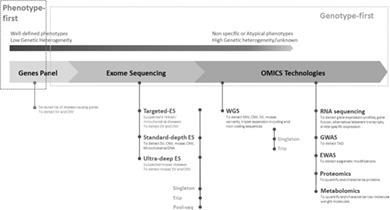当前位置:
X-MOL 学术
›
Clin. Genet.
›
论文详情
Our official English website, www.x-mol.net, welcomes your
feedback! (Note: you will need to create a separate account there.)
Next-generation sequencing approaches and challenges in the diagnosis of developmental anomalies and intellectual disability.
Clinical Genetics ( IF 2.9 ) Pub Date : 2020-04-26 , DOI: 10.1111/cge.13764 Ange-Line Bruel 1, 2, 3 , Antonio Vitobello 1, 2 , Frédéric Tran Mau-Them 1, 2 , Sophie Nambot 1, 4 , Arthur Sorlin 1, 2, 4, 5 , Anne-Sophie Denommé-Pichon 1, 2, 4 , Julian Delanne 1, 4 , Sébastien Moutton 1, 4 , Patrick Callier 1, 2 , Yannis Duffourd 1, 2 , Christophe Philippe 1, 2 , Laurence Faivre 1, 4 , Christel Thauvin-Robinet 1, 2, 3, 4
Clinical Genetics ( IF 2.9 ) Pub Date : 2020-04-26 , DOI: 10.1111/cge.13764 Ange-Line Bruel 1, 2, 3 , Antonio Vitobello 1, 2 , Frédéric Tran Mau-Them 1, 2 , Sophie Nambot 1, 4 , Arthur Sorlin 1, 2, 4, 5 , Anne-Sophie Denommé-Pichon 1, 2, 4 , Julian Delanne 1, 4 , Sébastien Moutton 1, 4 , Patrick Callier 1, 2 , Yannis Duffourd 1, 2 , Christophe Philippe 1, 2 , Laurence Faivre 1, 4 , Christel Thauvin-Robinet 1, 2, 3, 4
Affiliation

|
Recent advances in next‐generation sequencing (NGS) technologies have revolutionized the field of human genetics. Alongside a broad panel of bioinformatics tools and databases, NGS technologies have unprecedentedly improved the molecular diagnosis rate and the identification of new genes associated with rare disorders. However, about 50% of patients remain without a final diagnosis. Here, we highlight the utility of NGS applications in developmental anomalies and intellectual disability, illustrating their main advantages and pitfalls. Through specific examples, we suggest novel strategies and tools for identifying the molecular bases in the remaining patients, and we outline future challenges.
中文翻译:

发育异常和智力障碍诊断中的下一代测序方法和挑战。
新一代测序 (NGS) 技术的最新进展彻底改变了人类遗传学领域。除了广泛的生物信息学工具和数据库,NGS 技术还前所未有地提高了分子诊断率和与罕见疾病相关的新基因的鉴定。然而,大约 50% 的患者仍未得到最终诊断。在这里,我们重点介绍了 NGS 应用在发育异常和智力障碍方面的效用,并说明了它们的主要优势和缺陷。通过具体的例子,我们提出了识别剩余患者分子基础的新策略和工具,并概述了未来的挑战。
更新日期:2020-04-26
中文翻译:

发育异常和智力障碍诊断中的下一代测序方法和挑战。
新一代测序 (NGS) 技术的最新进展彻底改变了人类遗传学领域。除了广泛的生物信息学工具和数据库,NGS 技术还前所未有地提高了分子诊断率和与罕见疾病相关的新基因的鉴定。然而,大约 50% 的患者仍未得到最终诊断。在这里,我们重点介绍了 NGS 应用在发育异常和智力障碍方面的效用,并说明了它们的主要优势和缺陷。通过具体的例子,我们提出了识别剩余患者分子基础的新策略和工具,并概述了未来的挑战。










































 京公网安备 11010802027423号
京公网安备 11010802027423号